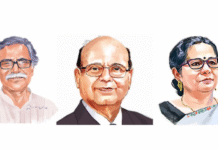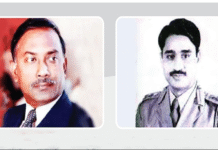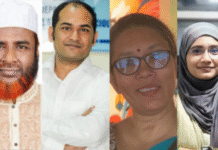THE 13th Amendment to the Constitution of the People’s Republic of Bangladesh wrote into the constitution the concept of non-party caretaker government to ensure a smooth transition of power of one elected government to another. The 15th Amendment to the constitution struck off the caretaker concept, apparently in pursuance of the decision of the apex court, to the effect that the caretaker concept was unconstitutional. Emphasis has been laid by some politicians on the aspect of democratic continuity, meaning that the republic cannot be governed for any length of time by unrepresentative persons as envisaged in the 13th Amendment.
It is interesting to observe that our politicians across the board have at one time or another emphasised upon the virtues of non-party caretaker dispensation under the stewardship of non-political and unelected persons. It would appear to discerning readers that in our quest for democracy we have often conducted ourselves quite erratically. One could refer to the origin of the caretaker concept. It was quite unprecedented that in 1995-96 the ruling party in a sense was ordered to bring a bill for constitutional amendment in fulfillment of the opposition’s demand. Experts opine that it was not a healthy democratic precedent.
Ironically, we now have a similar situation wherein the main opposition is demanding to bring a bill for constitutional amendment in fulfillment of its demand. In fact, the government is being asked to negate its own actions, and that too of a very recent past. In all these transactions the people are led to believe that all efforts are being made in the interest of furthering our democratic progression.
Curiously enough, during the anti-autocracy movement in the late 1980s, in the declaration of the three political alliances, there was a draft provision for a caretaker government for the next few elections. This was not acceptable then to the two mainstream political parties. In their defense, the politicians would say they could not ever foresee that a Magura-like irregular and illegal situation could arise.
In our passionate advocacy for democratic conduction of state affairs, we lost sight of the fact that the 13th Amendment of the constitution did draw the supreme judiciary into politics. In fact, the role of the political chief executive of the Republic, howsoever short it may have been under the 13th Amendment, contained the danger of distorting the constitutional scheme in which our Supreme Court exists and exercises its power and jurisdictions. The point to note is that neither the 13th Amendment nor the 15th Amendment of the constitution came as a result of joint efforts of the main political parties. Unfortunately, the obstinacy and stubbornness of the party in power prevailed over everything else.
In view of the current near stalemate situation over the issue of political arrangement for overseeing the conduction of national election, the question of democratic culture assumes special significance. The democratic culture is required to be practiced by all those who are in the business of politics. The institutions of the state can assist but cannot resolve political difficulties. The fundamental principles of equity and fairness that are constitutionally enshrined will bear no meaning if the spirit of moderation takes leave of our warring politicians. Surely the courts cannot nurture that spirit.
To be in power is the be all and end all in our situation. The general people have to be used and utilised for that. The political parties can organise mass meetings and meet the huge expenditures incurred. The people have to roar for politicians’ sake. Our democrats do not appear to be concerned about miseries of abject poverty, dehumanisation of the unemployed young and the deception of the poor and the deprived. Our freedom of association has unfortunately been painfully licentious.
The combative postures and policies have to be replaced by reasoned actions. Coercive show of strength will beget the same in future as blood begets blood. The people must not be made to suffer in a movement to dislodge an elected government. We should be concerned at the nation’s fate where political power games get being played periodically at short intervals.
The resolution of our present political crisis depends on flexibility and perhaps a little less rigidity. In the one-sided murky general election of February 1996 there was a resort to rampant and open corrupt and unfair practices. That election was a tremendous impetus to the political opposition. The then prime minister not only launched the opposition to political power she also engaged herself in installing them to power.
Experts opine that the 13th Amendment to the constitution could have been avoided and the crisis could end with much less concession if earlier negotiations were fruitful. It is indeed sad that the element of grace is lacking in the kind of democracy that is practiced in our polity. None of the political parties is prepared to lose in a national election. If this proclivity is not reversed then democracy cannot be institutionalised and we will have to helplessly witness the defiling of the well-springs of political ethos. Hoping to win is not sinful but the determination to cling to power and retain it at all costs is.
Source: The Daily Star









